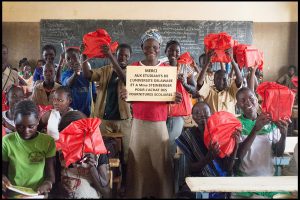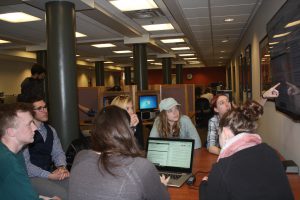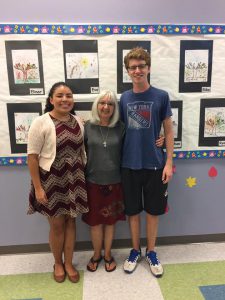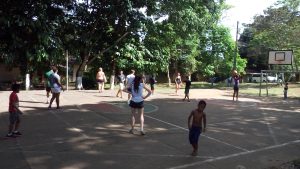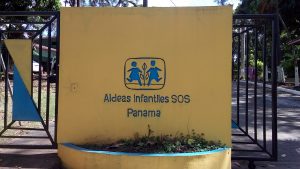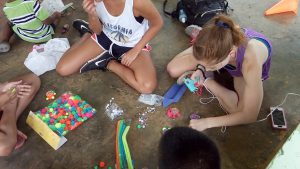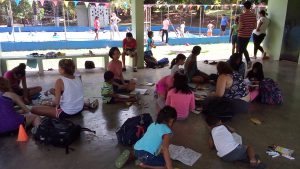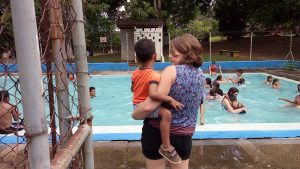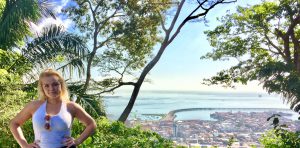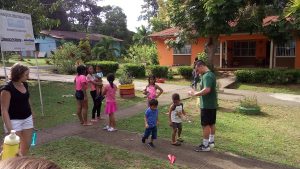Community Connections
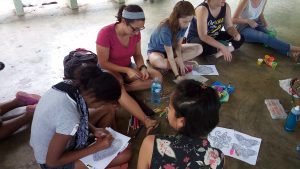 Community Engagement has become a top priority for the University of Delaware in recent years. In the spring of 2015, Provost Grasso launched the UD Community Engagement Initiative with the goal of enhancing the university’s identity and contributions as an engaged university. In the same year, the Carnegie Foundation for the Advancement of Teaching designated UD as a “community engaged university.” UD’s Community Engagement Initiative specifically focuses on “improving public education, health, and environmental quality; encouraging economic development; and expanding arts and cultural programs that enrich quality of life.” The Department of Languages, Literatures and Cultures has been an active participant in the goals of community engagement, not only in the local Delaware community, but also abroad. From organizing a Journée de la Francophonie to promote French cultural dialogue between local high school students, teachers, and members of the UD community (see https://lrc.dllc.udel.edu/2017journeedelafrancophonie/ ) to arranging a US-China Student Forum in which student delegates from both countries met at Xiamen University and East China Normal University to discuss and debate a variety of topics of social and cultural significance relating to globalization and global higher education (see https://lrc.dllc.udel.edu/us-china-forum/), our faculty members have worked to establish community connections. Below you will find the descriptions of several of the outreach projects by our faculty and students. Let us know if you would like to get involved!
Community Engagement has become a top priority for the University of Delaware in recent years. In the spring of 2015, Provost Grasso launched the UD Community Engagement Initiative with the goal of enhancing the university’s identity and contributions as an engaged university. In the same year, the Carnegie Foundation for the Advancement of Teaching designated UD as a “community engaged university.” UD’s Community Engagement Initiative specifically focuses on “improving public education, health, and environmental quality; encouraging economic development; and expanding arts and cultural programs that enrich quality of life.” The Department of Languages, Literatures and Cultures has been an active participant in the goals of community engagement, not only in the local Delaware community, but also abroad. From organizing a Journée de la Francophonie to promote French cultural dialogue between local high school students, teachers, and members of the UD community (see https://lrc.dllc.udel.edu/2017journeedelafrancophonie/ ) to arranging a US-China Student Forum in which student delegates from both countries met at Xiamen University and East China Normal University to discuss and debate a variety of topics of social and cultural significance relating to globalization and global higher education (see https://lrc.dllc.udel.edu/us-china-forum/), our faculty members have worked to establish community connections. Below you will find the descriptions of several of the outreach projects by our faculty and students. Let us know if you would like to get involved!
Dr. Deborah Steinberger
Global Outreach in French Theater Workshop and Translation Class
In spring 2017, students in Dr. Deborah Steinberger’s FREN 405/605, French Translation and Stylistics, put their linguistic skills to use to translate the website of Graines de Joie (Seeds of Joy), a humanitarian organization based in France. Dr. Steinberger’s first contact with Graines de Joie came in 2016, when her French Theater Workshop students presented a comedy by Paul Côte, Drapeau rouge et tasse de thé, as their final class project. Steinberger had read that Mr. Côte, a playwright based in France, generally refuses royalties, but asks that proceeds from the performance of his works be donated to fund educational projects for needy youth in Burkina Faso. It was at that point that Steinberger learned of the association Graines de Joie, which funds health care and educational projects to benefit children in Burkina Faso, Romania, and Brazil. Her French Theater Workshop students collected goodwill donations in lieu of admission fees at their performance, and through Graines de Joie, the class’s donation was used to purchase backpacks filled with school supplies for high school students in Guimgtenga, a neighborhood on the outskirts of Ouagadougou.
When the organization’s president, Laurent Fabri, expressed the desire to reach a greater public by making the organization’s website available in English as well as French, Steinberger enlisted the help of her FREN405/605 students, who worked in groups to translate different portions of the website. MAFLL student Quentin Bouvier says of the endeavor, “Working on a class project in order to help Graines de Joie has been a wonderful experience. It reminds us that languages are truly important in our modern world, to communicate, but also to help those who need it the most. More than just a final project for a class, this translation has been a way to gather men and women around one goal that truly matters: helping children.”
For more photos of the Workshop performance, see http://www.udel.edu/udaily/2016/may/french-comedy-052016/.
Ms. Stacey Hendrix, Dr. Cynthia Paris
Community School Outreach to Create Dual-Language Immersion Programs
DLLC students Patrick McGowan (Spanish Education major), Ashley Torres (BA Early Childhood Education 2017), and Katherine Leirey (BA International Business, Spanish Minor 2017) have established community connections with Delaware schools through the guidance of current and previous UD faculty members. Patrick McGowan worked with Ms. Stacey Hendrix, former DLLC Spanish instructor who now teaches at Sanford School, and Dr. Cynthia Paris, of the UD Laboratory Preschool, to set up an afterschool Spanish/English play group at the Lab School. While working there, Patrick commented: “The Lab School placement is something I look forward to every week because it is so refreshing to be around such innocent, happy, and eager-to-learn kids. Through the experience, I have learned how to teach Spanish in its simplest form. By working with the kids, I learned to be very patient; especially in this setting because you have to let the Spanish come to them and not force anything. It is an excellent experience, and the kids seem to love it too.”
Ms. Hendrix and Dr. Paris paired Patrick with a bilingual early childhood education HDFS student, Ashley Torres. On the work of Patrick and Ashley, Debbie Torbert, Master Teacher & Special Programs Coordinator at the UD Laboratory Preschool observed: “The UD students collaboratively planned and implemented a program that takes place one hour per week, operating for five weeks. This unique program used a play-based environment, and introduced English and Spanish vocabulary to children who spoke primarily English, and were interested in learning Spanish. Two of the children were Spanish speaking, and so using English more comfortably was a goal for them. As the weeks progressed, we observed the two Spanish-speaking children begin to embrace their ability to speak two languages, supporting the other children in the class as they translated words for their friends! Due to the success of the pilot in the fall, we have continued to offer Spanish/English to our children and families three more times.”
Katherine Leirey also worked with Ms. Hendrix and Marie Cowgill, a kindergarten teacher at Newark Charter School, to develop a program to offer home English language support for kindergarten students. Katherine and Ms. Hendrix assisted Ms. Cowgill in creating “Bilingual Butterflies” a program to teach English through art and the use of the word “hello” in both English and the home language.
Dr. Jorge Cubillos
Spanish Learning in Panama: The Story of a Transformational Experience Abroad
Study Spanish in Panama? Why? Why not go to Spain, Mexico or Argentina? Well, while the University of Delaware does offer study abroad opportunities in all those countries (and more than fifty other destinations around the world), since 2006, the Department of Languages, Literatures and Cultures has been sponsoring a unique study abroad program in the heart of Panama City, Panama at the Universidad Tecnológica de Panama (the country’s MIT).
The winter program in Panama City originated as a cultural exchange in the “Partners for the Americas” program inspired by President Kennedy back in 1964 to promote cooperation and mutual understanding throughout the Americas. Initially, this study abroad program sought to help Spanish education majors reach the elusive Advanced Level of proficiency required for teaching certification, while assisting with English language instruction at various high schools throughout Panama City. Over the years, however, the scope of the program was expanded to include all Spanish majors and minors, always with a focus on the development of advanced oral skills. Because of this emphasis on oral communication, DLLC’s study abroad program in Panama has a specialized curriculum, a strict oral proficiency admission standard, a Spanish-only policy at school and at the home-stays, and a required service-learning component, in which students give back to the local community by leading educational and recreational activities for at risk children at the Aldeas Infantiles SOS.
At the Aldeas, UD students get to use not only their Spanish skills, but also their artistic and/or sport interests with children ages two to eighteen in the afternoon, after their regular academic classes at the Universidad Tecnológica. Much can be said about the linguistic and personal impact of this service-learning task. It is probably best to let two recent program participants describe their experience in their own words:
Caitlin Blades (BAFLL Spanish 2017)
During my study-abroad experience in Panama City this winter, I had the incredible opportunity to participate in a service-learning course at the SOS Children Village orphanage. There are SOS Children’s Villages in more than 130 countries, supporting families and helping at-risk children grow up in a protective home, away from abusive parents, poverty, and unsafe conditions. The service-learning projects increased my interaction with Panamanian culture and social inequities, allowed me to practice and strengthen my communication skills, and ultimately had a positive impact on the community through volunteer work.
At SOS Children’s Village in Panama, I had the choice of many hands-on service- learning projects, ranging from coloring and painting, swimming, playground activities, and soccer. Naturally, I chose soccer because I had six years of experience to pass along to the children. When I would arrive each day, the children would run out of their small concrete yellow and pink houses to play. This was one of the most rewarding feelings, knowing that I spent with them the hour out of each day that they looked forward to the most. Even though they were living in an orphanage, away from their families, the children made a community there, one that I was able to join.
I had my own soccer team that met on the farthest soccer field each day. By the third week, I was officially on the team of Captain Alex who had the best control of a soccer ball that I have ever seen. All the boys wanted to play professionally, to be just like the men in the FIFA soccer posters hanging above their beds. I was astonished by the skill that Alex possessed, so I asked him if he had ever played on a team. He told me that he had taught himself everything he knew playing late at the orphanage and that he wanted to play on a team but it was hard to while living at the orphanage. He then told me that he was waiting for a call back for a boy’s youth team. His response took me aback for a moment. I could not grasp how someone with such potential would never have the opportunity to fulfill it.
During the first day of my soccer service learning, I recognized my own weaknesses. I went to go say, “Shoot!” and “Pass it wide!” and I was lost for words. I didn’t know these words in Spanish and the children didn’t comprehend English so I had to improve. I wrote all the sayings down that I knew I needed during the game, and studied them each night at home. By the end of the first week, I was a professional soccer player and communicated very well with my team. With my communication skills constantly being challenged both during soccer and water breaks, I felt a change in myself. By the end of the trip, I had improved six points on my Versant test, and I know that I owe the majority of my improvement to the children of the orphanage.
Throughout this experience, I was able to interact positively with the local community and make a lasting impact on the future generation of Panama citizens. Through my encouragement, I hope that the children realize that they have so much potential; they just have to look forward and not behind at their difficult pasts. I have learned that I, myself, have many opportunities that I have been taking for granted in addition to the power that I have to make a difference in someone’s life. The day I left, as my eyes began to tear up, I remember wishing that someone else would come and fill my space when I was gone. Someone to play soccer with them, to be their role models and use their ears to listen to their struggles. I know today, that I used to be on the outside looking in but now I feel like I am on the inside. I finally understand that it is the little things in life that matter, an hour a day playing soccer, a donation of shoes and towels to a family without, and a joke every now and then. In my daily life now, I take nothing for granted and I will continue to leave my heart on my sleeve… well, the parts of it that I did not leave behind in the SOS Children’s Village.
Niko Herrera (Spanish, Marketing major)
Working with the children of the orphanage was both a meaningful and humbling experience. In my opinion, this project was about finding something greater than myself, something to devote my time to that will make a difference. It was about making a difference in the lives of children who are much less fortunate. I believe that as students, we played an important role in this project. We needed to be there for the kids and to some way, or somehow, make their day a little better. I also feel that our role was to brighten each child’s view of the future, to show them that there is something better to look forward to once they leave the orphanage.
I came in with an open mind and with the desire to make an impact on at least one of the child’s lives. Although we prepared for our time at the orphanage, at times obstacles came up that required us to make quick decisions. For instance, the child that I connected with best often felt disconnected from the group and at times I would get up and do my best to make him happy and get him back into the activity.
Throughout this project I had to tap into some of the skills I have acquired throughout my life. For starters, I had to incorporate my knowledge of Spanish to be able to communicate with the kids and make connections with them. This was something new and challenging to me as I have never spoken to children in Spanish, but could understand them without a problem. Secondly, I had to bring down my shield of being shy. Normally I’m not very social in situations with new people, but for this, I wanted to make as great an impact as possible, therefore I took that shield down and came out strong. At the end of the day, no matter what I knew or didn’t know, I had to step out of my comfort zone to make a positive impact and use everything I’ve learned.
This project has enabled me not only to learn about the kids, but to learn about myself. Through the kids, I could see a side of myself that is giving, compassionate and caring. Normally I don’t exhibit those characteristics daily, but with the kids I felt like it was necessary to connect with them and to make a difference. Children every day would come up to me and call me by name, ask to do our handshake and ask me to play soccer with them. If I hadn’t established a connection with them, they wouldn’t remember my name, let alone ask me to interact and play with them. It meant the world to me when kids like Álvaro, would come up to me running and give me a hug.
One might wonder how this project can be applied to the life of a college student. This project has forever changed me for the better and will have a long-lasting impact on my life. First off, it has shown me that my problems aren’t as big as they may seem. Every day I would look at these children and think about how they didn’t have parents to go home to every day, or to take care of them, or to love them. It would break my heart to think about that considering how close I am with my parents and how much they mean to me and how much they do for me. Secondly, I have learned that even people who have so little and don’t have much to be happy about, are usually the ones who are the happiest. These kids with little hope of ever getting adopted into a family are still happy and are never without a smile on their face. At the end of the day, this whole project was eye-opening to me and something I will never forget. I learned not only about the kids but about myself. It was an experience that will positively affect me for the rest of my life and hopefully shape me into a better person.
For more student comments, please view the URL for week “two” of the program, which is a good example of what the “self-driven” cultural component the Panama program is all about:
http://sites.udel.edu/panama17w/category/segunda-semana-en-panama/.
These comments are in Spanish; to view the final English assessments of the program by the program participants, view the “Uncategorized” link.
Correction: An earlier version of this article stated that Patrick McGowan worked with Ms. Stacey Hendrix and Dr. Cynthia Paris to set up an afterschool Spanish/English play group at Newark Day Nursery. The program was created at the UD Laboratory Preschool.
This entry was posted in Cover Story, Polyglot and tagged Cover Story, Fall 2017 Polyglot.

